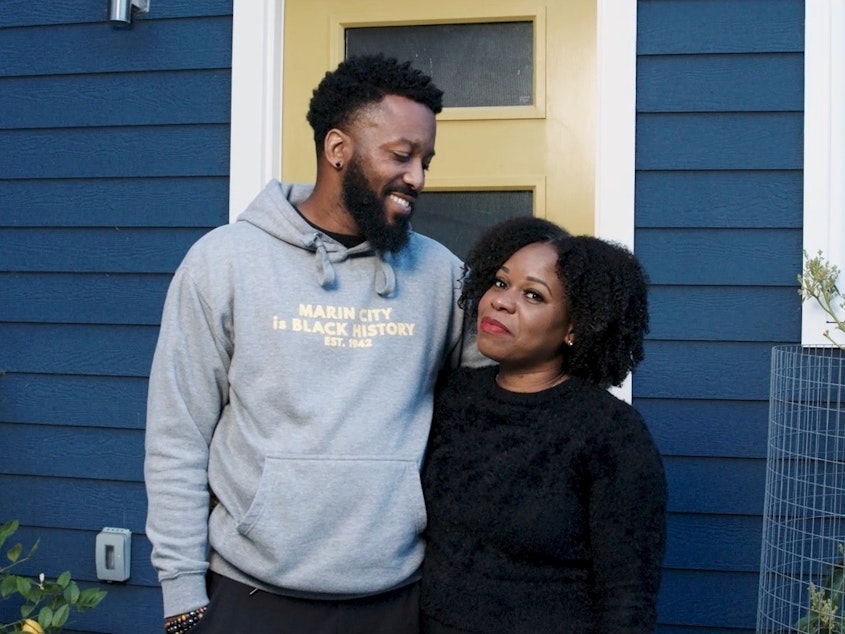Black couple settles lawsuit claiming their home appraisal was lowballed due to bias

When Paul Austin and Tenisha Tate-Austin sued their real estate appraiser, her company, and the company that hired her for allegedly under-valuing their home based on their race, they were after more than just financial restitution.
The African American couple, who own a home in Marin City, Calif., wanted the individuals and the companies involved in shortchanging them to change how they would appraise Black and Latino-owned properties moving forward.
They think they're on their way to doing that.
Late last month the pair reached a settlement agreement with Janette Miller in the federal housing discrimination lawsuit that included an undisclosed amount of money. But more important, their lawyer told NPR, it mandates that the licensed real estate appraiser "agrees not to discriminate in the future."
Miller, who the Austins have described as an older white woman, must also attend a training session on the history of segregation and real estate-related discrimination in Marin County, provided by Fair Housing Advocates of Northern California, which participated in the suit as a co-plaintiff.
And there's more education in Miller's future: She has agreed to watch a 76-minute documentary called Our America: Lowballed, about discriminatory practices in the appraisals industry, which recent studies have shown is widespread and result in higher values for homes when occupants are white, and can plummet if they are people of color. The Austins are heavily featured in the film, produced by ABC Owned Television Stations.
"The crux of this case has much more to do with the indignity of what they believe to be a racially biased appraisal rather than the monetary damages," Julia Howard-Gibbon, an attorney for FHANC who represented the Austins, told NPR.
Miller, who doesn't have to admit any liability in the case, did not respond to NPR's requests for comment.
A tale of two appraisals
Marin City sits about 10 minutes north of San Francisco. It's a hilly, historically Black community in an unincorporated part of Marin County, where houses rarely come up for sale. Howard-Gibbon said usually about two to three are put on the market in any given year.
So in 2016, when Paul and Tenisha saw a listing for a $550,000 house, they jumped on it.
A few years later they embarked on a series of major upgrades, according to court filings. They added about 1,000 square feet to the house, expanded the living room and added a deck with views of the San Francisco Bay. To help pay for the work, they decided to refinance their mortgage.
The lender hired Janette Miller to inspect the home and come up with a new valuation that would determine whether or not the Austin's would qualify for a loan. Miller's appraisal concluded that the market value of the home at the time was $995,000.
Less than a year earlier, when they had applied for a previous mortgage refinance, the house had appraised at $1,450,000.
The Austins were shocked. The new appraisal was far too low for their loan to be approved.
"They told the lender that they didn't agree with the appraisal because there were a lot of things in the appraisal that they felt were incorrect or inappropriate. And they also felt that the appraisal came in low because of their race," Howard-Gibbon said.
The lender agreed to send a different appraiser.
This time the couple decided to "white wash" the house. They removed family photos and art work, books, hair products and anything else that might indicate that a Black family lived there. They also asked a white friend to be present at the house and greet the appraiser as if she were the homeowner and to display some of her family photos in the house. The Austins were not at home during the appraisal.
The new appraiser concluded the house was worth $1,482,500 – nearly half a million dollars higher than Miller's estimated value.
The lawsuit alleged that "[r]ace was a motivating factor in Miller's unreasonably low valuation of the Austins' house."
One of the primary pieces of evidence, Howard-Gibbon said, was Miller's use of comparable sales in the area, which is one of the factors appraisers consider in determining a home's worth.
But since there's such little turnover in Marin City, Howard-Gibbon argues that Miller should have expanded her survey to neighboring Sausalito and Mill Valley — communities that have homes that are more similar to the Austins' newly remodeled property, are predominantly white and have much higher home values.
"It seemed like she sort of drew an invisible line around the city, which seemed odd based on the fact that there were so few sales and there was so little information to be drawn from the sales that did happen in that area," Howard-Gibbon said.
The Austins are glad to put the lawsuit behind them
"Having to erase our identity to get a better appraisal was a wrenching experience," Tate-Austin said in a statement.
"We know of other Black families who either couldn't get a loan because of a discriminatory appraisal and therefore either lost the opportunity to buy or sell a home, or they had to sell their home because they had an unaffordable loan."
Her husband, Paul, expressed similar feelings.
"We're glad that we can put this lawsuit behind us," he said in the same statement.
He added: "Having to experience everything that came with receiving the lowballed appraisal was overwhelming. Being able to tell our story and knowing we had legal recourse helped. We want others to know that if you experience discrimination, you can go to your local fair housing agency so they can investigate your case and help you if you want to file a complaint." [Copyright 2023 NPR]



